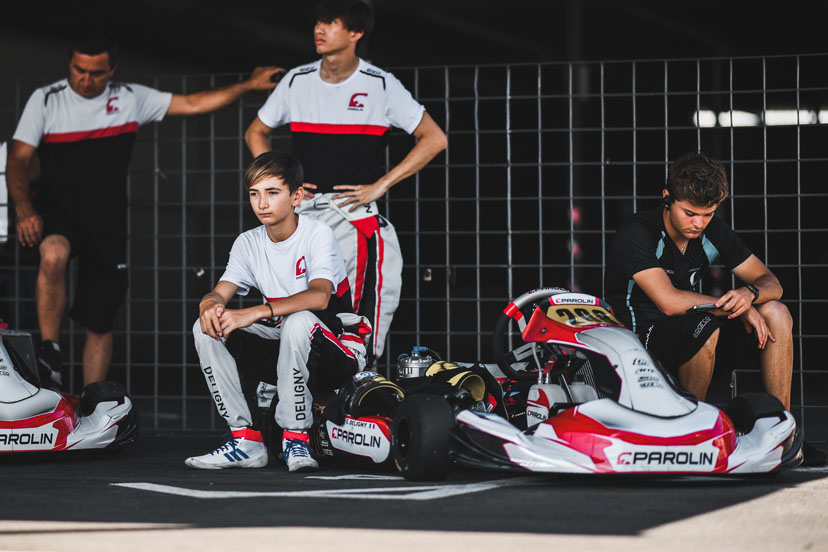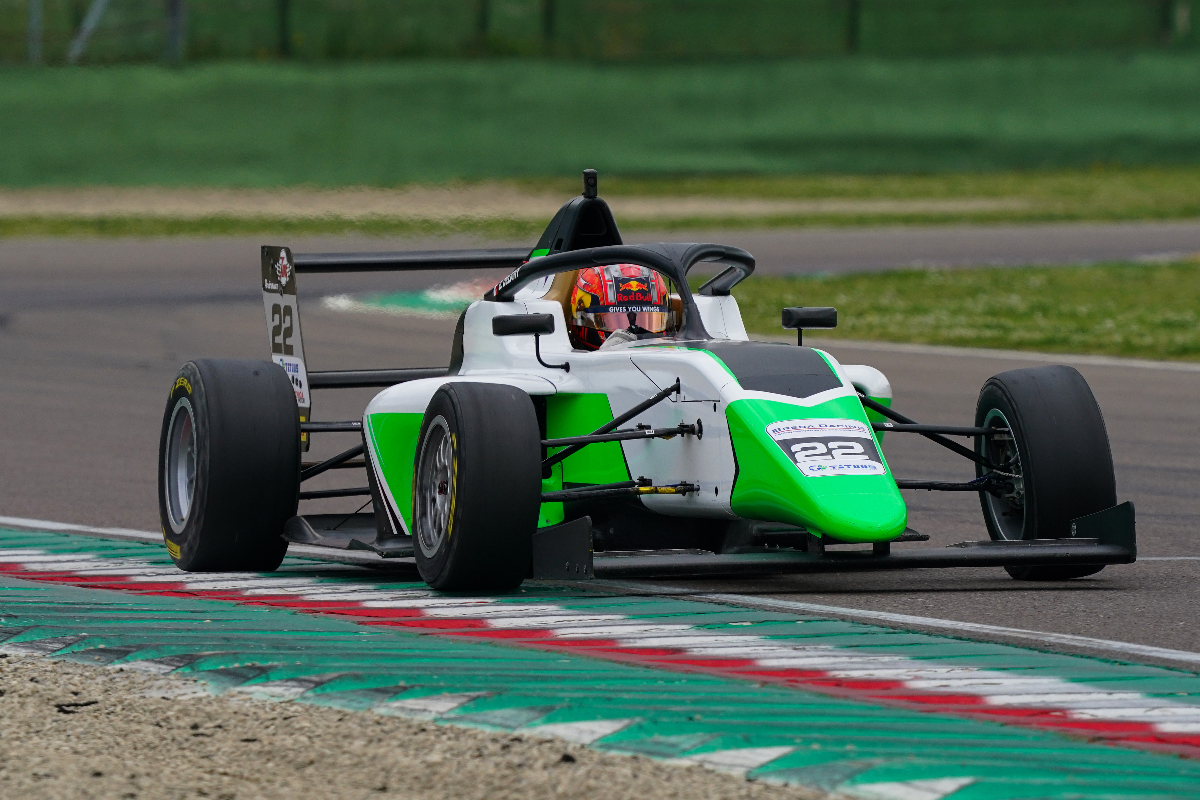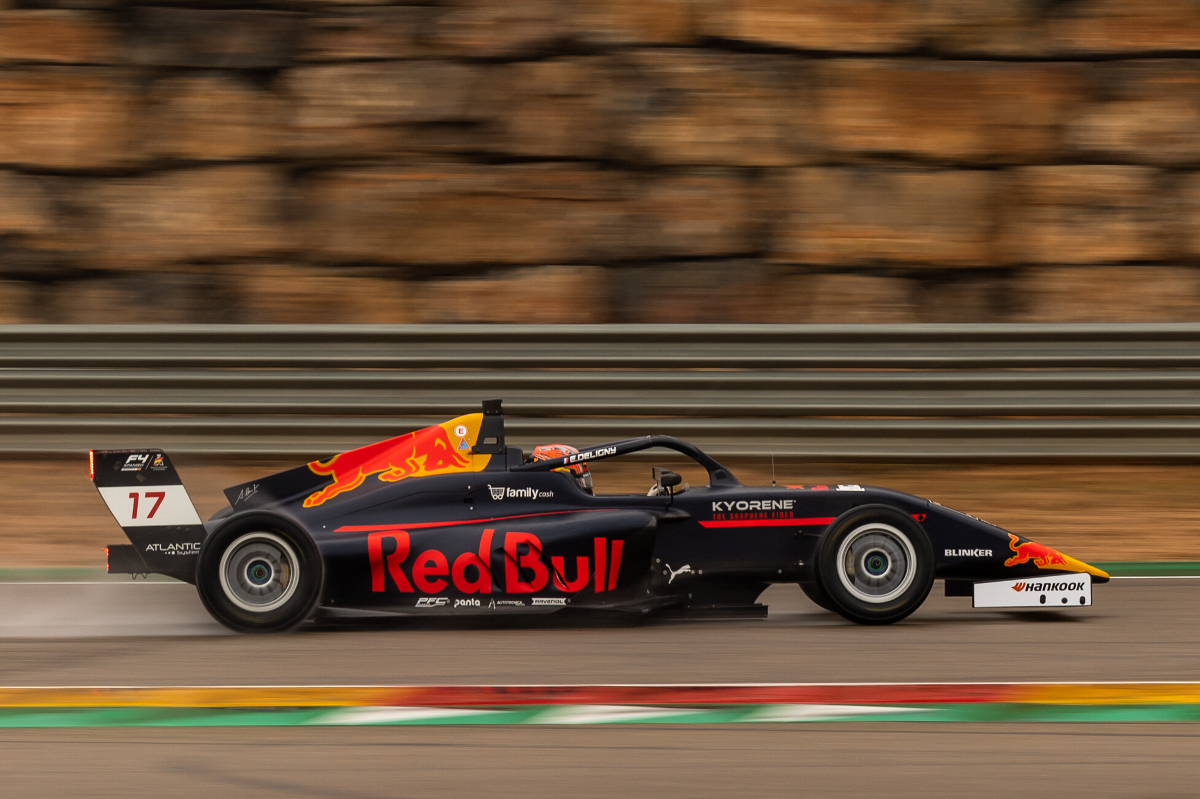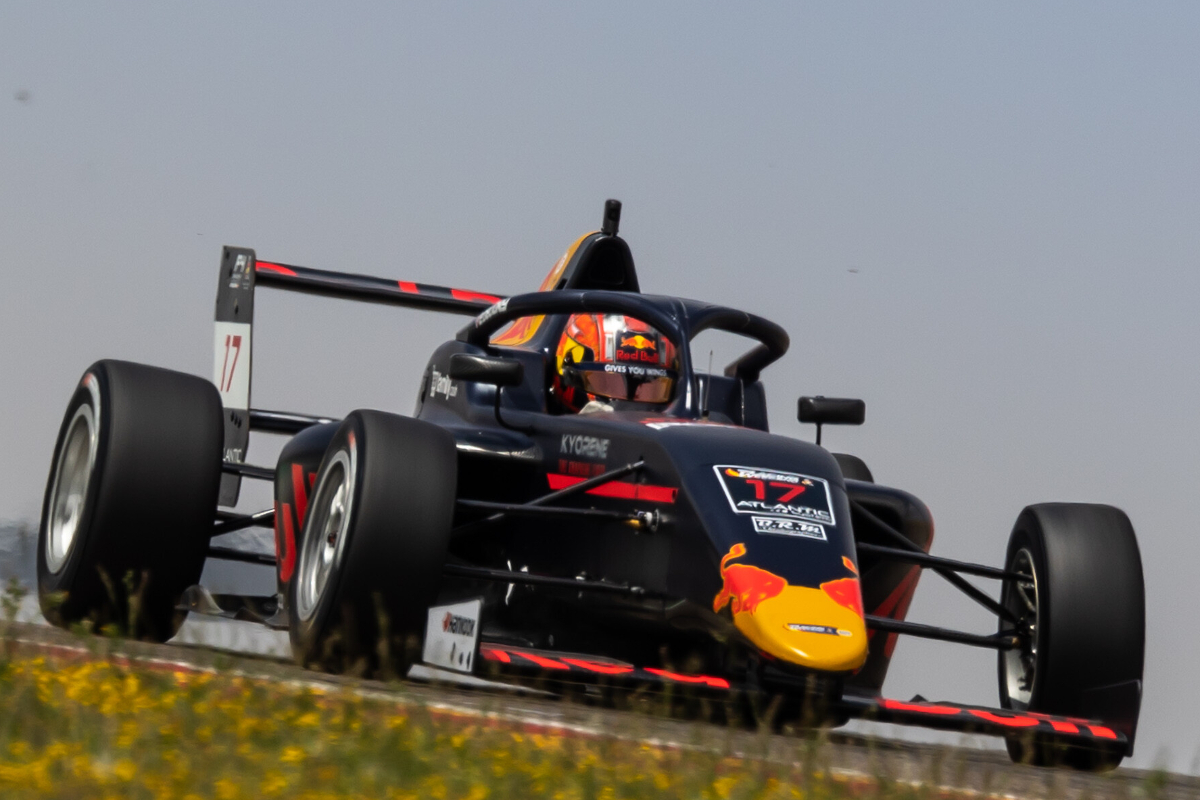
Photo: KSP Reportages
After his karting successes in 2022, there was a buzz of excitement for the single-seater debut of new Red Bull junior Enzo Deligny, who also has the personal support of one of karting’s modern superstars
Formula Scout caught up with Deligny to talk about signing for Red Bull, how the COVID-19 pandemic indirectly helped his career and the vital role double World Karting champion Lorenzo Travisanutto has played as coach, mentor and “big brother”.
Deligny has joined reigning double champion team Campos Racing for his introduction to single-seaters in this year’s Spanish Formula 4 championship.
As Deligny explains, the team’s 2022 champion Nikola Tsolov – now in Formula 3 – was instrumental in getting him the seat.
“I know him well,” he tells Formula Scout. “We used to play on the simulator together a lot. He was asked who would be a good replacement for him, and he suggested me, so that’s how Campos found me basically.”
“[They made contact in] early 2022. I went to their factory, and we started working together. On my side, we thought it was a good team and [that] it would be a good plan for this year, and they were obviously interested in me too. So, it just clicked, and we signed the contract.”
Spanish F4 has grown in stature since switching to a Gen2 F4 car, and Deligny faces competition from the likes of Brazilian F4 champion Pedro Clerot, Sainteloc Racing’s Theophile Nael and Campos team-mates Christian Ho and Matteo de Palo. His sights are set on replicating Tsolov’s title success as a rookie.
“My inner goal is to win the championship, but also to drive my best, learn as much as possible and be happy with my performance at the end of the year.”

Photo: ACI Sport
Deligny was 11th in the standings after round one at Spa-Francorchamps, having finished 22nd, fourth and 16th in the three races there, then later in May at Motorland Aragon a win and two second places lifted him to fourth in the points.
But Deligny’s car racing debut actually came in a surprise last-minute outing with AKM Motorsport in the Italian F4 season opener at Imola in April, five days after reaching the minimum age of 15, It was some welcome practice ahead of Spanish F4.
“We’d been talking to some other Italian teams but then [team boss Marco] Antonelli just said that he had a free car and, since I turned 15 a couple days ago, I was allowed to do it.”
While the Italian series remains the most competitive F4 series in Europe, Deligny never seriously considered it as an alternative to Spain.
“We committed to do the Spanish because I think it’s more fair. You have more teams that have an opportunity to win so it was a good alternative to the Italian,” he explains.
“We saw [Imola] just as an opportunity to learn and to get ready for the Spanish championship.”
The move into cars came after an outstanding season in senior karting last year, coming second in the WSK Euro Series, fourth in the CIK-FIA European championship and sixth in the WSK Super Master Series as a rookie on OK karts.
How has he found the transition from karting? “So many things are different,” he says. “If I had to pick the hardest [thing] it would probably be the very different style of racing. Not necessarily how you drive it but how you manage it in a race.”
“In karting it’s mostly flatout all the time and you just do your best. But in F4, it’s a lot more complicated. You have to think of a lot more things, while karting’s pretty straightforward. In F4 you have to take a lot more information in, like for example the brakes and all these tiny other details, and execute it on track.”

Photo: Red Bull Content Pool
Born in Shanghai to a French father and Chinese mother, Deligny “grew up half in Shanghai and half in Los Angeles”. His first karting race was on his fifth birthday, on the kart track within the Formula 1-hosting Shanghai circuit.
After finishing second in the USA SuperNationals in Las Vegas in 2019, “we got an offer to drive in Europe, and that’s when COVID-19 hit”. However, the pandemic brought one big advantage for managing a karting career.
“Basically, it was quite good for us because my school was online on Zoom and since it was online there was no physical need to be in Los Angeles, so we took the opportunity to go try a couple of races in Europe,” he tells Formula Scout.
His school lessons may have become virtual, but they hadn’t disappeared completely, so “I had to do school from seven to midnight every day”, continuing his studies online through to the end of the school year.
Having moved to Europe, “initially, we didn’t expect to stay that long but the family was enjoying life in Italy, so we decided to stay a little longer”.
In 2020 he stepped up from mini to junior karting, and was second in the ROK Cup International Final for ROK Junior karts. Becoming a Parolin factory driver for 2021 meant the focus was more on OK Junior kart competitions, and the move was to change his career trajectory in more ways than one.
Lorenzo Travisanutto, a former Nico Rosberg protege who had already won two CIK-FIA World championship titles and a European championship title, the South Garda Winter Cup, WSK Euro Series and Final Cup, had joined the team the year before and was about to step up to KZ2 shifter karts.
Alongside his own racing, at the beginning of 2021 he had started coaching another member of Parolin’s OK-J squad, Guillaume Bouzar.

Photo: KSP Reportages
As Deligny carries on the story: “We started talking and he started giving me some tips. In my fourth race [event] in 2021 I started on pole position for the final and finished fifth because I completely messed up that race and got nervous.”
“There he already started helping me and that’s when we realized he could be a really good coach for me,” says Deligny, so “we decided to work together”.
Despite the disappointing end result that weekend, his “really strong race” there had also helped convince him and his family that “we have the potential to do good”.
Deligny is quick to credit the co-operation with Travisanutto – who has since won the FIA Karting International Super Cup (the KZ2 equivalent to the World championship) – for his development through 2021 and 2022.
“In 2021, when I first arrived in Europe from the US, I was pretty clueless about what to do,” he admits.
“I was already a decent driver back then, but not capable of really winning a race. I still had a lot of issues back then like getting nervous before a race, making these silly mistakes, and he really pushed me to the maximum. He was the one who developed me as a driver. He helped me everywhere but definitely [a lot] on the mental side, for sure.
“At the end of 2021 we got our first win together [in the Champions of the Future round series]. So it was really a quick progression. And together last year we won two events [a WSK SMS and a WSK Euro Series round] and he definitely played a big, big role in that,” he relates.
For Deligny, Travisanutto is much more than a driver coach: “He’s like my big brother. He helped me in basically everything, not only on track but off track he helped me develop as a driver and just fulfill my talents in karting at least.”

Photo: Red Bull Content Pool
“I think we understand each other very well and he guides me through the way.
“I stay with him, and he accompanies me to the races quite often and you know a bit off track with the media and talking to mechanics, engineers, because in the US it was quite chill, like nothing much but he introduced me to how everything was done here [in Europe]. So obviously the technical things on track but then how everything was working off track.”
Deligny’s performances in the last two seasons attracted the attention of The Grid, the management agency that handles Pierre Gasly and Nyck de Vries, and through them got the attention of Red Bull Junior Team chief Dr Helmut Marko.
The first contact with Red Bull came, Deligny “in the middle of last year, when I stayed one month with Travisanutto and we had a really, really strong period. I won nine out of 11 heats at one point and I was really extremely fast, I started pole position for the European Championship, won in the WSK Euro Series and then in another WSK race I was leading when my engine cut out and that was unlucky.
“And that’s when Red Bull took notice through my manager [Guillaume Le Goff, co-founder of The Grid] and eventually it was really not too long of a process.
“Before that we were already talking to some other academies, but Red Bull within a couple of weeks just said ‘yeah, we’re interested; we want him,’ and signed me,” he says slightly matter-of-factly.
Although Deligny was courted by many of the F1 junior teams before Red Bull, he is reluctant to divulge the names of them. He was impressed by the ease and straightforwardness of dealing with the team that is currently F1’s dominant force.
“They said, ‘okay, we want you’, while some other academies were like ‘maybe, you know first go through this training camp and then we’ll see’, so that was good for me,” he explains.

Photo: Red Bull Content Pool
Deligny reckons the RBJT is the best driver development programme that is attached to an F1 team, and references the Red Bull athlete status that is given not just to racing drivers but to competitors across all kinds of sports worldwide.
“They develop them so they actually really care about their drivers or their athletes and help obviously on the physical, technical side and then also on the financial side a lot.”
A first visit to Red Bull Racing’s headquarters in England is on the agenda, but he was hugely impressed by his experience of the Red Bull Athlete Performance Center outside Salzburg in Austria. “That was great,” he enthuses. “All the work that they put in, all the machines that they have for their athletes. It’s really good to see.”
He still awaits his first in-person meeting with Marko, who is revered and feared as a hard taskmaster for his juniors, although he has met “Pierre [Gasly] and some other big names with Red Bull”.
For 2023, Deligny does not feel under any additional pressure from Red Bull’s support. They haven’t set any “specific targets,” he says, “but just to do the best I can basically. And obviously, the expectation is to be competitive and to be up there.”